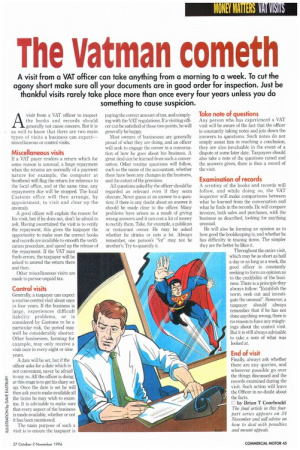The Vatman cometh
Page 55

If you've noticed an error in this article please click here to report it so we can fix it.
Avisit from a VAT officer to inspect the books and records should generally not cause concern. But it is as well to know that there are two main types of visits a business can expect— miscellaneous or control visits.
Miscellaneous visits
If a VAT payer renders a return which for some reason is unusual, a large repayment when the returns are normally of a payment nature for example, the computer at Southend will flag the return for reference to the local office, and at the same time, any repayments due will be stopped. The local Customs office will then arrange, by appointment, to visit and clear up the anomaly.
A good officer will explain the reason for his visit, but if he does not, don't be afraid to ask. Having ascertained the visit is to verify the repayment, this gives the taxpayer the opportunity to make sure the correct books and records are available to smooth the verification procedure, and speed up the release of the repayment. If the VAT man finds errors, the taxpayer will be asked to amend the return there and then.
Other miscellaneous visits are made to pursue unpaid tax.
Generally, a taxpayer can expect a routine control visit about once in four years. If the business is large, experiences difficult liability problems, or is considered by Customs to be a particular risk, the period may well be considerably shorter. Other businesses, farming for example, may only receive a visit once in every eight or nine years.
A date will be set, but if the officer asks for a date which is not convenient, never be afraid to say so. All the officer is doing at this stage is to get his diary set up. Once the date is set he will then ask you to make available all the items he may wish to examine. It is advisable to make sure that every aspect of the business is made available, whether or not it has been mentioned.
The main purpose of such a visit is to ensure the taxpayer is paying the correct amount of tax, and complying with the VAT regulations. If a visiting officer can be satisfied of those two points, he will generally be happy.
Most owners of businesses are generally proud of what they are doing, and an officer will seek to engage the owner in a conversation of how he goes about his business. A great deal can be learned from such a conversation. Other routine questions will follow, such as the name of the accountant, whether there have been any changes in the business, and the extent of the premises.
All questions asked by the officer should be rewarded as relevant even if they seem obscure. Never guess at an answer to a question; if there is any doubt about an answer it should be made clear to the officer. Many problems have arisen as a result of giving wrong answers and it can cost a lot of money to rectify them. Take, for example, a publican or restaurant owner. He may be asked whether he drinks or eats a, lot. Always remember, one person's "lot" may not be another's. Try to quantify it.
Any person who has experienced a VAT visit will be aware of the fact that the officer is constantly taking notes and jots down the answers to questions. Such notes do not simply assist him in reaching a conclusion, they are also invaluable in the event of a dispute at some later date. Taxpayers should also take a note of the questions raised and the answers given, there is then a record of the visit.
A scrutiny of the books and records will follow, and while doing so, the VAT inspector will make comparisons between what he learned from the conversation and what he finds in the records. He will compare invoices, both sales and purchases, with the business as described, looking for anything unusual.
He will also be forming an opinion as to how good the bookkeeping is, and whether he has difficulty in la-acing items. The simpler they are the better he likes it.
Throughout the entire visit, which may be as short as half a day or as long as a week, the good officer is constantly seeking to form an opinion as to the credibility of the business. There is a principle they always follow: "Establish the norm, seek out and investigate the unusual". However, a taxpayer should always remember that if he has not done anything wrong, there is no reason to have any misgivings about the control visit. But it is still always advisable to take a note of what was looked at.
Finally, always ask whether there are any queries, and wherever possible go over the things discussed and the records examined during the visit. Such action will leave the Officer in no doubt about the facts.
LI by Brian T Courbould The final article in this fourpart series appears on 24 November and will advise on how to deal with penalties and mount appeals.








































































































